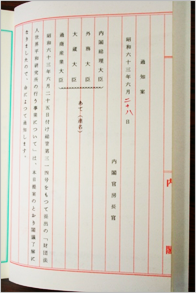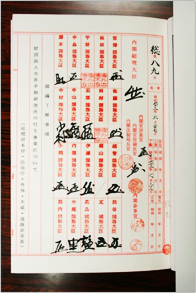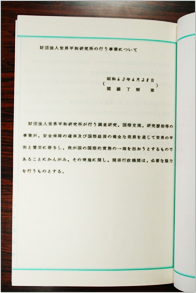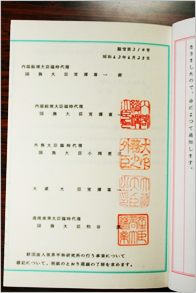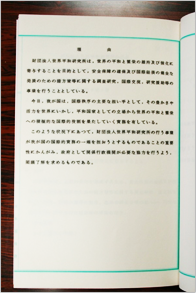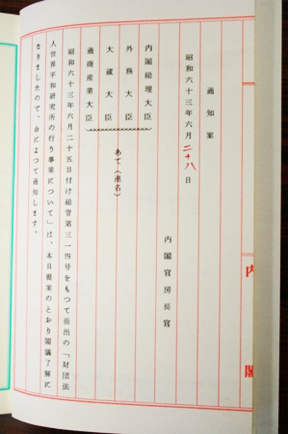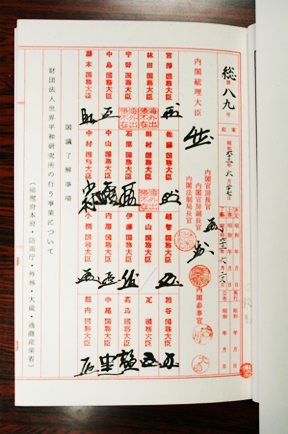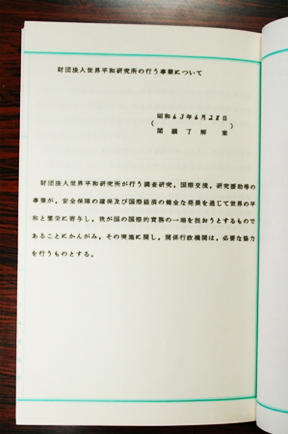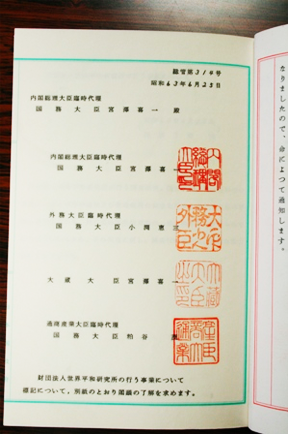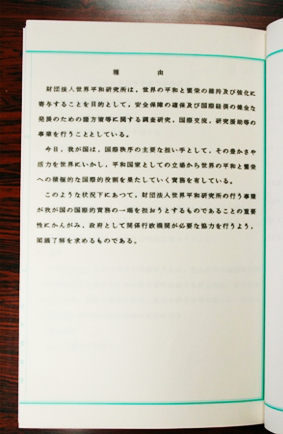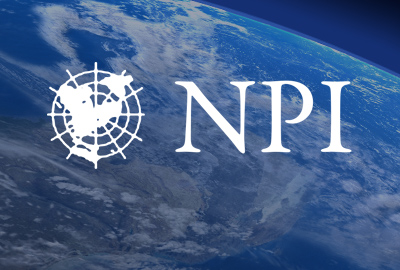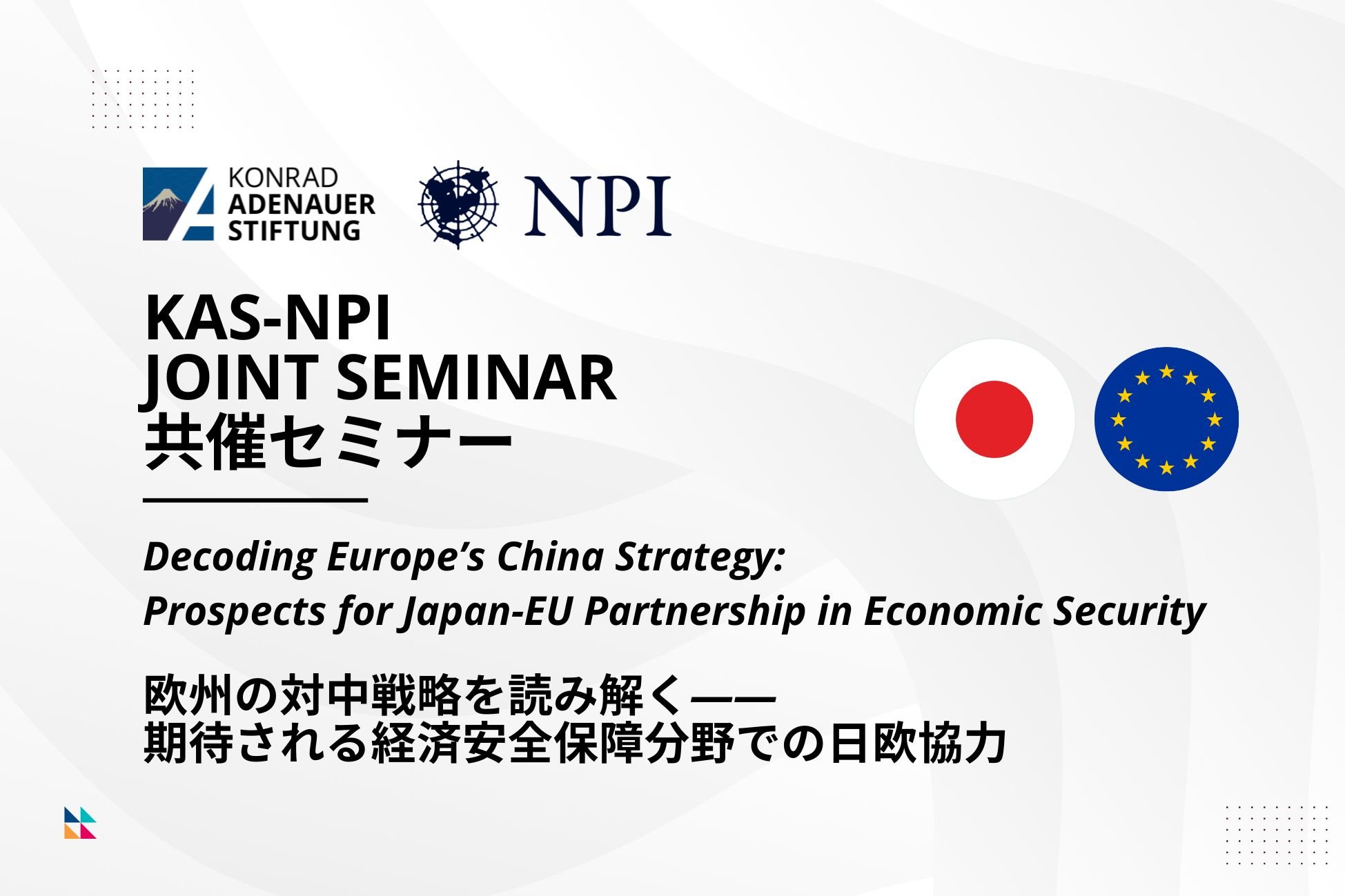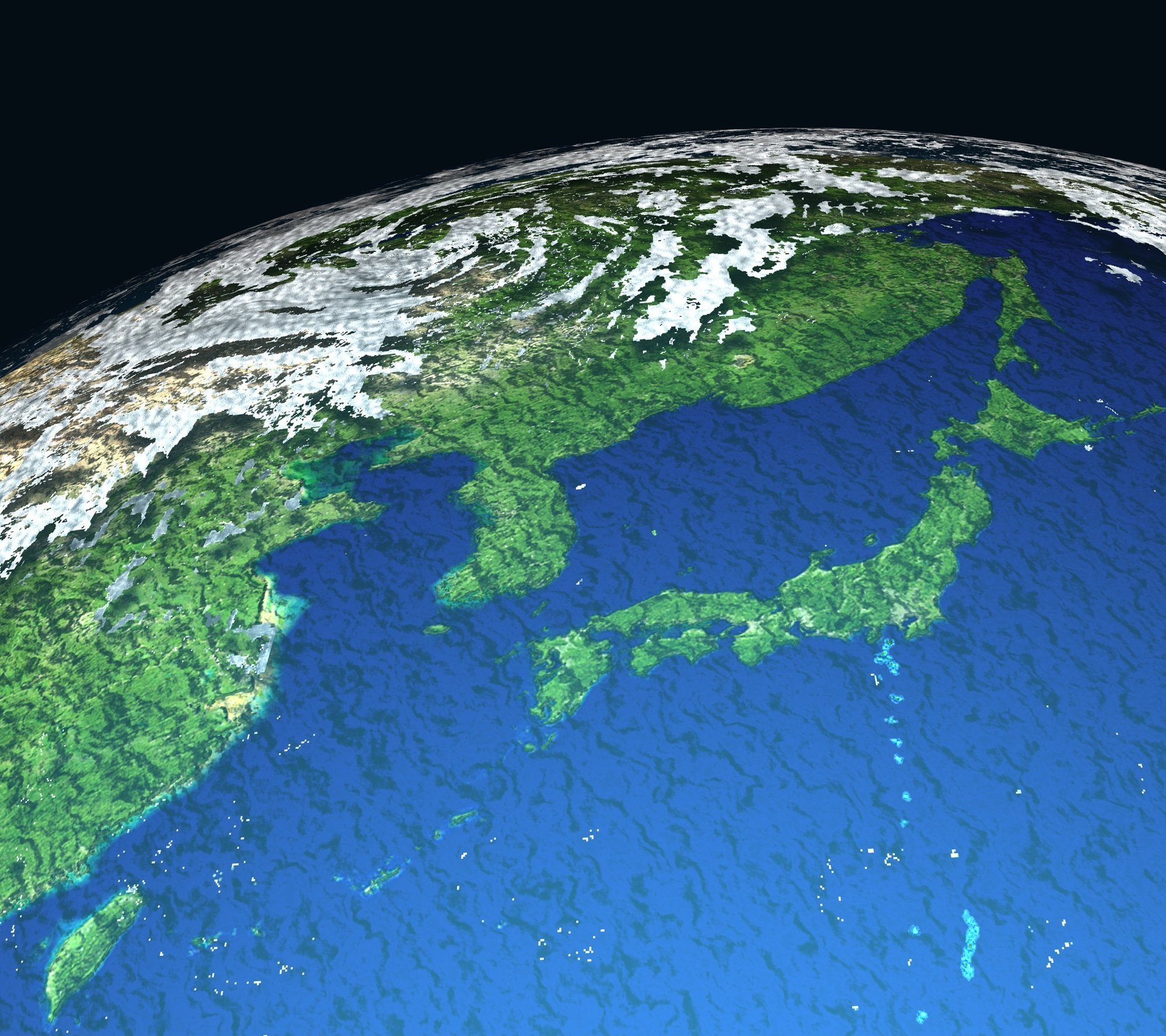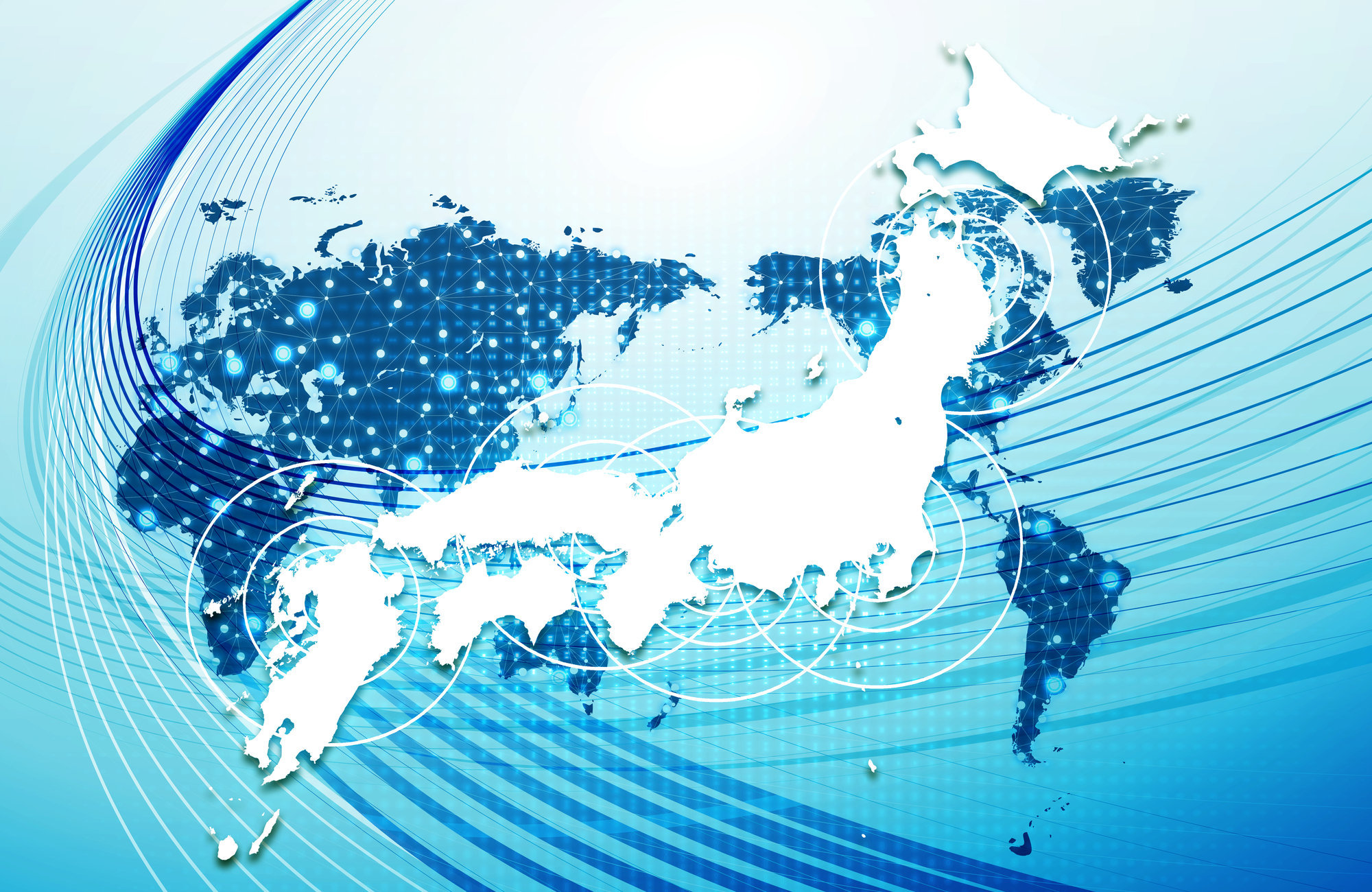Milestones
History of the Institute
When he was prime minister, Nakasone Yasuhiro, the founder and first chairman of the Institute, realized that there were few influential public interest organizations in Japan that conducted research in politics and economics, as well as policymaking, and decided to establish an institute that would be comparable to leading institutions in other countries.
On June 28, 1988, he founded the International Institute for Global Peace (IIGP) with the aim of developing a policy-oriented research and advisory organization that would bring together the good sense and wisdom of people in Japan and overseas on important issues facing the international community, deeply consider them from an independent standpoint, and widely disseminate creative and constructive proposals. The Institute was established with the approval of the Cabinet that the government would provide cooperation by the six ministries of the Prime Minister’s Office, the Defense Agency, the Economic Planning Agency, the Ministry of Foreign Affairs, the Ministry of Finance, and the Ministry of International Trade and Industry.
The first Chairman emphasized comprehensive policy proposals not only on diplomatic and security issues, but also on domestic and international politics, economics, and other fields, and he himself wrote many proposals together with eminent experts. In particular, in 2005, the Institute published a “Proposal for Constitutional Reform,” which created a stir in the world debate. In addition, in order to promote international intellectual exchange, the Institute places great importance on exchange not only with Europe and the United States, but also with other Asian countries. The Japan-China Forum was established in Beijing in 1993, the Japan-Taiwan Forum in Taipei in 2002, and the Tokyo-Seoul Forum in Tokyo in 2010, and active exchange in these forums continues. Furthermore, the Nakasone Yasuhiro Award was established in 2004 to recognize young people who have made significant achievements internationally. The purpose of the Award is to contribute to achievement of a truly peaceful and prosperous international society by encouraging new activities while honoring the efforts of young people.
In 2011, the Institute became a public interest incorporated foundation, and, in January 2018, it was renamed Nakasone Peace Institute (NPI). In 2020, with the dissolution of the Seiunjuku Foundation, a donation of materials and facilities was received and the Nakasone Yasuhiro Library, also known as Seiunjuku Memorial Hall, was opened. The Library provides a place for research and education by the general public and researchers studying Japan’s postwar political and diplomatic history.
Although the world situation is constantly changing, we believe that the intent of the Founding Document written by Nakasone Yasuhiro, our first chairman, has not faded, and we will continue to develop our activities in accordance with the spirit of the Document with an eye on the coming era.
We look forward to your continuing encouragement and support.
Milestones
1988
March
Establishment of preparatory office to open International Institute for Global Peace (IIGP).
June
International Institute for Global Peace (IIGP) established.
Establishment approved by Cabinet.
Nakasone Yasuhiro assumes office of first president and chairman of the board of directors.
1989
November
Japanese-language IIGP newsletter Vol.1 No.1 issued.
December
English-language IIGP newsletter Vol.1 No.1 issued
First issue of the Chairman’s newsletter Kojimachi Dayori published in 1993.
1993
October
First Japan-China Forum held in Beijing.
Institute’s English name changed to Institute for International Policy Studies (IIPS).
1994
January
First issue of Asia-Pacific Review English-language academic journal published.
2001
January
Outline of Japan’s Comprehensive Strategy published.
2002
First Japan-Taiwan Forum held in Taipei.
2005
January
"Proposal for Constitutional Reform" issued.
June
First Nakasone Yasuhiro Award ceremony held.
2006
September
“Japan’s National Vision for the 21st Century” issued in 2008.
2008
January
IIPS named one of the top 30 think tanks in the world by the Foreign Policy Research Institute (FPRI).
2010
October
IIPS launches Quarterly, a Japanese language journal, as an extension of IIPS News.
First Tokyo Seoul Forum held in Tokyo.
2011
April
IIPS becomes a public interest incorporated foundation.
“What is the Japan-U.S. Alliance?” published.
2013
October
"Proposal for the 25th Anniversary of the World Peace Research Institute—Japan Shining in the World in 1975" published.
2018
January
Institute renamed Nakasone Yasuhiro Peace Institute (NPI: Nakasone Peace Institute).
November
"Policy Essays in Commemoration of the 30th Anniversary of the Foundation" issued.
2019
March
NPI digital newsletter launched
2020
November
Nakasone Yasuhiro Library and Seiunjuku (Takasaki City, Gunma Prefecture) becomes part of NPI.
2021
October
Aso Taro becomes the second chairman.
Chairman
| First | NAKASONE Yasuhiro, former Prime Minister of Japan |
| Second | ASO Taro, former Prime Minister of Japan |
President
| First | NAKASONE Yasuhiro, former Prime Minister of Japan |
| Second | HIRAIWA Gaishi, former Chairman of Tokyo Electric Power Company |
| Third | YAHIRO Toshikuni, former Chairman of Mitsui & Co., Ltd. |
| Fourth | OKAWARA Yoshio, former Ambassador to the United States |
| Fifth | SATO Ken, former Vice-Minister of Defense |
| Sixth | FUJISAKI Ichiro, former Ambassador to the United States |
| Seventh | NAKASONE Hirofumi, Member of the House of Councillors |
Executive Director of Research
| First | SATO Seizaburo, Professor, University of Tokyo |
| Second | YAKUSHIJI Taizo, Professor, Keio University |
| Third | KITAOKA Shinichi, Professor, The University of Tokyo |
| Fourth | KUBO Fumiaki, Professor, The University of Tokyo |
| Fifth | KAWASHIMA Shin, Professor, The Graduate School, The University of Tokyo |
Letter of Intent from Nakasone Yasuhiro, Founder and First Chairman
May 17, 1988
The international community is currently in a period of great transition. The remarkable destabilization of the international monetary and trade system in recent years and the relative retreat of the leadership of the U.S. and Soviet superpowers are nothing but evidence that the basic framework of international relations since World War II is undergoing a transformation. The transition period, in which the traditional system is dysfunctional and no new framework has emerged, is a particularly dangerous and unstable transition period. From catastrophic all-out wars to civil unrest and terrorism, the world today faces a multitude of potential and actual threats. We cannot ignore the danger of a collapse of the free economic order due to intensifying economic friction and the worsening of the accumulated debt problem.
In order to overcome such a dangerous transitional period and build a more peaceful and prosperous world, we need to be able to accurately see the changes in the situation, where the problems lie, and how to solve them.
In particular, it is an urgent task for Japan to fulfill its leadership potential befitting its enhanced international status, not only in the economics field, but also in the intellectual and policy fields.
However, until now, Japan’s efforts to gather a wide range of good sense and wisdom from inside and outside the country, to deeply consider the important issues facing the international community from a free standpoint, and to make creative and constructive proposals to the world have been insufficient. In spite of Japan’s growing international status and responsibility, and the growing importance of the Asia-Pacific region, Japan’s voice and communication from Japan and the Asia-Pacific region is still too weak. It is no exaggeration to say that fostering an internationally renowned and influential research institute for international affairs in Japan is an indispensable project for Japan, which aims to become an international nation.
In view of these circumstances, we hereby establish the International Institute for Global Peace (IIGP) as a policy research and advisory organization with a global perspective and open to the international community with the aim of contributing to the realization of a more peaceful and prosperous world.
Cabinet Approval
June 28, 1988
About the Projects Conducted by International Institute for Global Peace (IIGP)
In view of the fact that the International Institute for Global Peace (IIGP) contributes to world peace and prosperity through efforts to strengthen security and the sound development of the international economy, and that the Institute provides research assistance, and that the Institute is intended to play a part in fulfilling Japan’s international responsibilities, the relevant government ministries and agencies shall provide necessary cooperation in the implementation of such projects.


